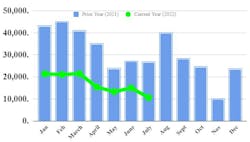July Class 8 orders down sharply, two firms report
Two leading trucking industry research firms reported Aug. 3 that they had measured substantially weaker Class 8 order activity in July.
FTR Transportation Intelligence showed preliminary July orders at 10,600 units—their lowest level since last November. Meanwhile, ACT Research reported July orders slightly higher than FTR at 11,400 units.
Order activity was the weakest for the month of July since 2019, down 33% from June this year and 60% lower year-over-year, according to a release from FTR. Class 8 orders have now totaled 244,000 for the past 12 months, FTR noted.
See also: First look: Western Star’s all-new on-highway truck
In June, both trucking research firms found that heavy-truck orders increased only modestly over May but that June orders also were way lower than this time last year. For June, both showed Class 8 orders at around 15,000 units, though ACT’s estimate was a little higher at 15,500 units.
OEMs have essentially run out of build slots for 2022 and are not yet entering orders for 2023, according to FTR. Continued supply chain disruptions are limiting OEM output in 2022 and the fluctuating cost of materials and components has caused delays in confirming orders for shipment next year, according to FTR. However, demand for new trucks remains brisk, the FTR release said.
“Orders, though paltry, met expectations since OEMs have filled almost all available build slots this year,” said Don Ake, vice president of commercial vehicles for FTR. “July is typically the weakest order month of the year, so it is no surprise orders dipped to around 10,000 units. Fleets continue to shop around, looking for available trucks, but they are becoming increasingly difficult to find. The supply chain is improving very slowly, but not nearly enough to meet demand.”
“It's like when popular concert seats are sold out, you get no sales the next day,” Ake added. “Class 8 trucks are popular and in scarce supply in 2022. The OEMs just don’t have the capacity to meet the high demand this year. OEMs could increase production by about 10% over the current rate if they could get the parts, but the supply chain remains clogged.”
See also: Volatile markets mean fleets must revisit accounting
However, Eric Crawford, ACT’s VP and senior analyst, said his firm saw the possibility of something more in the July numbers than just a typical seasonal slowdown.
“Do we think July’s weak orders represent the end of healthy demand? Perhaps,” he said. “Recent spot rate weakness, and our expectation that a freight recession is inbound, would suggest yes.”
“That said, considering 1) Class 8 backlogs stretch into 2023, 2) ongoing supply-chain issues, albeit easing somewhat, and 3) inflationary cost pressures, leave the OEMs in no rush to open order boards for 2023,” he added. “In light of this confluence of factors, plus typically challenged seasonality in Q3, we hesitate to extrapolate too much from a data point that could prove to be an outlier. To be sure, though, it is a data point that warrants increased vigilance going forward.”
Crawford noted, “Per the backlog analysis and OEM build plans in ACT’s July State of the Industry: NA Classes 5-8 Vehicles report, the 2022 backlog was oversubscribed, with 39k more orders scheduled to be built than build slots available, at the end of June, and June cancellations were negligible.”
FTR's Ake concluded, “Despite the economic uncertainty, demand for new trucks is expected to remain robust in 2023. Freight is still forecast to grow at a steady clip. When booking commences for 2023, possibly as early as September, Class 8 orders could reach record heights.”
In the medium-duty sector, ACT said Class 5-7 net orders were slightly better at 13,500 units than the Class 8 total.
About the medium-duty orders, Crawford said, “July demand for medium-duty vehicles was similarly challenged, representing the lowest seasonally adjusted total since the pandemic—likely, at least in part, evidence of the shift in consumer spending from goods to services.”
Final data for July is expected later this month from both FTR and ACT. The numbers released Aug. 3 are preliminary, according to both research firms.
About the Author
Scott Achelpohl
Managing Editor
Scott Achelpohl is a former FleetOwner managing editor who wrote for the publication from 2021 to 2023. Since 2023, he has served as managing editor of Endeavor Business Media's Smart Industry, a FleetOwner affiliate.


